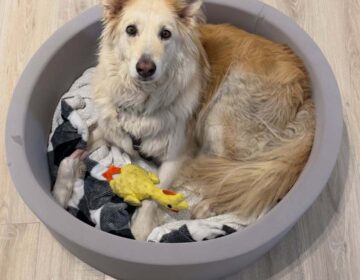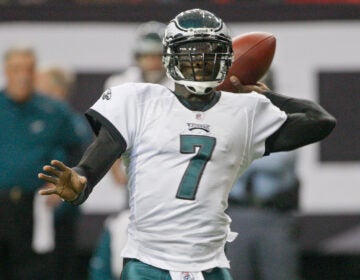This Mullica Hill dog trainer draws on past trauma to help rehabilitate anxious and abused pups
On National Dog Day, a South Jersey trainer shares how her past trauma helps her connect with and rehabilitate abused, anxious dogs.
Listen 7:14
"It takes a lot to be a survivor — and not just survive — but overcome and flourish and thrive," says Nicole Buck, the founder and CEO of Buck's Dog Training in Mullica Hill, New Jersey. (Buck's Dog Training/Facebook)
From Philly and the Pa. suburbs to South Jersey and Delaware, what would you like WHYY News to cover? Let us know!
Editor’s note: This story contains references to child abuse and animal abuse, which some readers may find distressing.
For Nicole Buck, training dogs goes far beyond “sit,” “stay” and “heel.” As the founder and CEO of Buck’s Dog Training in Mullica Hill, New Jersey, Buck specializes in working with behaviorally challenged dogs — many of whom struggle with deep-seated anxiety.
Her success, she says, is rooted in something deeply personal: a childhood marked by profound trauma. In a candid conversation with WHYY’s Jennifer Lynn on “Morning Edition,” Buck opened up about how her own history of abuse fuels her empathy — and effectiveness — with the animals she helps rehabilitate.
___
Nicole Buck: There is a lot of debate on that, and what I’ve found, in my experience, is that it is mostly nurture and very little nature. Now, that’s not to say there aren’t some dogs who are genetically predisposed — aggression is actually a genetic predisposition, so it can be passed on genetically. Most of the time, it’s their environment. It’s the way they’re raised. It’s how they’re treated by humans and the world around them that will cause them to become aggressive.
Jennifer Lynn: And you must have heard some horror stories about what animals have been through. That’s the hard part of what you do.
NB: Absolutely. It’s heartbreaking when you hear the stories of dogs being abandoned, being abused, tied up outside for literally years, being starved to death, never getting any human exposure. So yeah, there’s a slew of stories that I could tell you.

JL: Well, we still find these animals can be very lovable.
NB: 100%. I find that a lot of times, the ones that have the least human contact crave it the most and become some of the best dogs ever once they’re rehabbed.
JL: What are some examples of various levels of problematic behavior that you’ve seen?
NB: Some of the worst, believe it or not, are anxiety. So dogs will — especially when they’re fearful or aggressive — it’s due to anxiety, as opposed to just pure aggression. Pure aggression is very rare. A lot of dogs who are anxious, nervous, skittish, under-socialized or underexposed to different environments completely shut down. I actually have a dog like that. She had never really been exposed to the outside world other than this little pen, and when she first came to me, I had to literally carry her up and down the stairs. She couldn’t walk on a hardwood floor. She was afraid of doorways. It took about two months to completely rehabilitate her. She wasn’t even aggressive, she was just so fearful of everything that we had to socialize her slowly.
JL: And you use a lot of positive reinforcement. What is that in a nutshell?
NB: In scientific theory, there are four quadrants, and positive reinforcement is the R+. That’s where you introduce a positive to reinforce or continue a behavior that you want to continue to see. So that is probably 90% of what we use.
JL: And R+ is a popular training method that emphasizes rewarding good behavior. Now, you have very deep empathy for the struggles that dogs experience. Can you share with us some of your own story, to the degree that you’re comfortable doing so? You had a harrowing upbringing outside of the U.S. as a little girl?
NB: Absolutely. So, I am adopted. I originally came from South Korea, and I know what it’s like to feel abandoned because my mother died suddenly when I was 3 years old. My one and only real memory of her is actually lifting a tarp as she’s lying on the ground and seeing her dead face — her body.
After that incident, my biological father became an extremely abusive alcoholic and tried several times to kill both my brother and myself — until one point, he almost drowned us. That was sort of his wake-up call. He finally decided to give us up for adoption before he went down that final route.
You know, I’ve dealt with all sorts of abuse — from physical to verbal to sexual — so I know what it’s like to deal with that level of abuse. It’s why I have a special affinity for dogs who have experienced abuse from a physical or psychological standpoint. It makes it easier for me to be able to identify and empathize with them, but also to help rehab them because I went through a rehab process myself.
JL: First of all, so sorry about your story and your experience, and thank you for sharing that. It’s very personal. Tell me about the keen ability you have to work with these animals. What’s an experience you can share about that?
NB: Some people call it stubbornness. Some people call it willpower. But I don’t give up — and these dogs don’t give up. Dogs are very unique in that respect. No matter what you do to them — unless it’s to the extreme point — they will always want to bond and give back to humans.
It’s something I identify with, and it’s why I have such a passion to help them out, because in that respect, they are just such unique creatures.
JL: How do you know when you’ve achieved some sort of relationship with a dog that you’re working with — that you’ve achieved the sense of security or the beginning of that? What does that feel like? What’s that aha moment?
NB: So for me, when a dog is acting — almost misbehaving a little bit — getting their personality to come through, their mischievousness to come through, that’s when I know I’ve gotten their trust. Because they trust me enough to misbehave, which is very counterintuitive, but that’s when I know: “OK yes, now I can start working with you and gaining that control, because now you trust me enough to show me your true personality.”
It takes a lot to be a survivor — and not just survive — but overcome and flourish and thrive. That’s really where I want to leave a legacy.
JL: What about the trust with the dog’s owner?
NB: Now, that’s a whole different ball game. It’s a good thing I have a psychology degree.
JL: OK, that’s a whole other conversation. Thank you, Nicole.
NB: Thank you so much. I really appreciate your time.
JL: Nicole Buck is the founder and CEO of Buck’s Dog Training in Mullica Hill, New Jersey, and she spoke with us on WHYY’s “Morning Edition” on National Dog Day.

Get daily updates from WHYY News!
WHYY is your source for fact-based, in-depth journalism and information. As a nonprofit organization, we rely on financial support from readers like you. Please give today.






